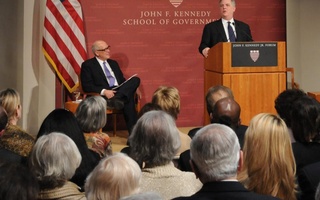
Adrienne C. Rich, Class of ‘51, died this week at the age of 82. Rich was internationally known for her explorations of the realities of womens’ lives and of contemporary society with her pose and poetry.
After a writing career that spanned more than six decades, feminist poet and activist Adrienne C. Rich ’51 died Tuesday at the age of 82. Rich’s work, which includes numerous collections of poetry and prose essays, explored themes of women’s rights, racism, and politics.
“No poet with her linguistic gifts has done as much to make more of the world outside of poetry. She was clearly one of the major poets of her time,” said English professor Stephen L. Burt, who teaches and studies Rich’s work.
Her writing would evolve drastically during the course of her lifetime—a shift that mirrored her sometimes tumultuous personal life.
“She was a remarkable, generous, passionate woman,” said Frances Golden, Rich’s longtime literary agent.
“She was a tiny giant. She was very short, but her words and her poetry spoke very loudly.”
In 1953, Rich married Harvard Economics professor Alfred Conrad, with whom she had three sons.
In the 1960s her work grew increasingly radical, and poems like “Snapshots of a Daughter-in-Law” began to reflect a more critical view of the traditional roles of wife and mother.
“The experience of motherhood was eventually to radicalize me,” she wrote in an essay published in 1982.
After moving to New York in 1966, Rich became more involved in feminist and anti-war activism. She eventually separated from Conrad, who committed suicide a few months later.
In 1976, Rich began what would be a lifelong relationship with the writer Michelle Cliff. It was at this time she began writing extensively on her personal experiences as a lesbian woman and female sexuality more broadly. She publicly came out when her “Twenty-One Love Poems” collection was published that same year.
Cliff and Rich moved to Santa Cruz, Calif. in the 1980s and lived there together until Rich’s death.
Rich was unafraid to mix politics and art. She often used the critical attention that her poems garnered for political purposes.
In 1974, Rich was awarded the National Book Award, but refused to accept the honor individually. Instead, she and two other female nominees decided to share the prize in a gesture of female solidarity.
solidarity.
In 1997, Rich declined a National Medal of Arts to protest the “cynical politics” of the Clinton administration.
Read more in News
HMS Opens New Primary Care FacilityRecommended Articles
-
Friends with Money, and PrinciplesJames K. McAuley’s editorial comment (“Friends with Money,” Mar. 8, 2010) was crude and ill thought out.
-
Unequal and Un-AmericanOur unequal society has now reached an economic crisis point, with America’s poor and middle classes failing to make ends meet.
-
Always Wanting MoreThere’s no reason we can’t create still higher tax brackets
-
 Freshman Takes Baseball Roots into Rink
Freshman Takes Baseball Roots into Rink -
 Frank Rich Discusses Modern Journalism
Frank Rich Discusses Modern Journalism -
Jobs and CapitalismJobs was a model of wealth acquired not due to highly leveraged, socially prestigious gambling, but due to actual inventiveness.













